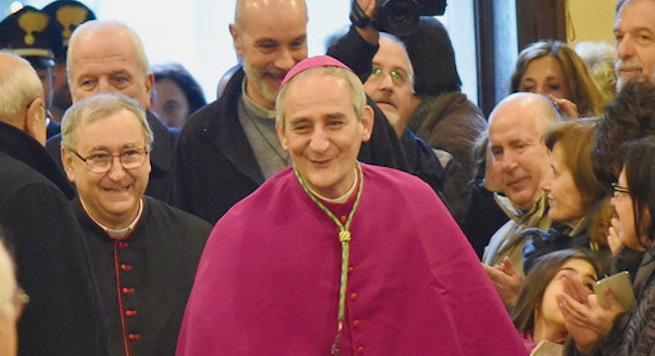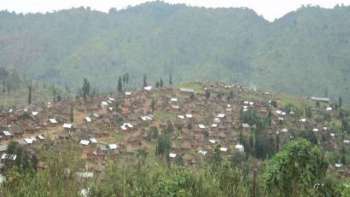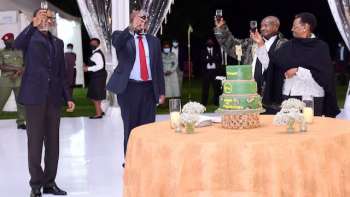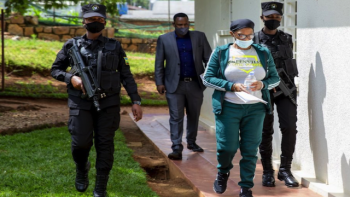Msgr Matteo Zuppi is the Archbishop of Bologna, the capital of Emilia Romagna. On September 1, 2019 Pope Francis announced the creation of Archibishop Matteo Zuppi as Cardinal.
"Great joy during the day of Saint Gilles - Msgr Matteo Zuppi, Archbishop of Bologna is created Cardinal. Best Wishes, Msgr Matteo... Leading from behind with humility, always at the service of others. " the Community of Sant'Egidio said in message and tweet received by AfroAmerica Netwok, while congratulating Archibishop Matteo Zuppi.
Ordained a priest in 1981, Archbishop , now Cardinal Matteo Zuppi was, until 2000, vicar of the parish of the Basilica of Santa Maria del Trastevere, in the heart of Rome, before being parish priest until 2010. He co-founded Sant'Egidio Community, in Santa Maria del Trastevere district and served as its chaplain for more than ten years. It is during that period that he mediated several political negotiations in Africa.
One of his greatest successes is the Mozambique Peace Accord, in which he was the chief negotiator representing the Sant'Egidion Community. He had taken over from the Christian Council of Mozambique (Council of Protestant Churches) and brokered the peace that ended the civil war in October 1992.
But there are many more peace processes he mediated, including negotiations in Rome, between 2007 and 2009 of what is known as the Kisangani Process. The Kisangani process was a series of negotiations between the government of Democratic Republic of the Congo (DRC) and the leaders of the Rwandan opposition organization, the National Democratic Congress (NDC), composed of Rally for Unity and Democracy (RUD-Urunana) and Rally of the Rwandan People (RPR). Msgr Matteo Zuppi worked closely with top NDC political and military leaders in Rome, over weeks of difficult negotiations between the Democratic Government and NDC and observers.
Under the mediation of Msgr Matteo Zuppi, the Kisangani Peace process agreement, cosigned on May 28, 2008, by the European Union, the World Bank, Southern African Development Community (SADC), United Nations Peace Keeping Mission in DRC (MONUSCO), OCHA, SIK-Norway, and the Eglise du Christ au Congo (ECC), the DRC government and NDC leadership agreed to a disarmament process of the armed wing of the two political groups.
The disarmed combattants and their dependent were gathered in a camp in Kasiki, Lubero Territory, in North Kivu Province, Democratic Republic of the Congo, in late May 2008, and started preparations to be repatriated to Rwanda or resettled in other countries or away from the border. However, a few months later, in 2009, Rwandan government, opposed to the peace process, attacked the refugee camp. Rwandan government troops, with the approval of DRC President Joseph Kabila, crossed into DRC and attacked the camp of disarmed combattants and their dependents, including women, children and elderly, killing most of them. The massacres of the RUD and RPR disarmed combattants and their dependents by Rwandan government troops led to the collapse of the process.
Despite the setback, Msgr Matteo Zuppi has continued his peace mediation initiatives.
Using his leadership at the Sant'Egidio Community, Msgr. Zuppi has, undoubtedly cultivated a sens of dialogue and a constant search of harmony and common ground among opposing sides.
In April 2017 in Bayonne, France, he mediated the disarmament of ETA, the Basque separatist organization, ending a 40-year old conflict that has killed more than 800 people since ETA's attempt to seek its own Basque state under Spanish dictator Francisco Franco. Commenting on the attendance the Catholic community of Sant'Egidio said that archbishop of Bologna, Matteo Zuppi was a "moral witness,..., known for having participated in several international reconciliation processes."
Maybe, it is this, and especially his humility, dedication, and connection with people, especially the voiceless, the poor and the meek, that Pope Francis appears to have such confidence in him. After three years as the auxiliary bishop of Rome, at the end of 2015, Msgr Matteo Zuppi was appointed by Pope Francis as the head of one of the most important Italian diocese, once led by prominent cardinals, from Giacomo Lercaro, the most important figure of the Second Vatican Council and Carlo Caffarra, who had died recently
















